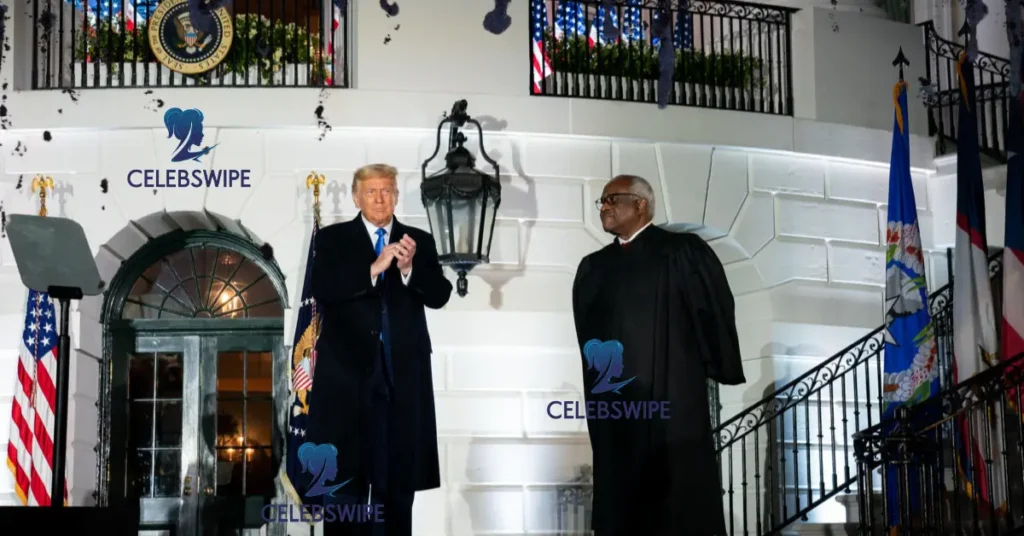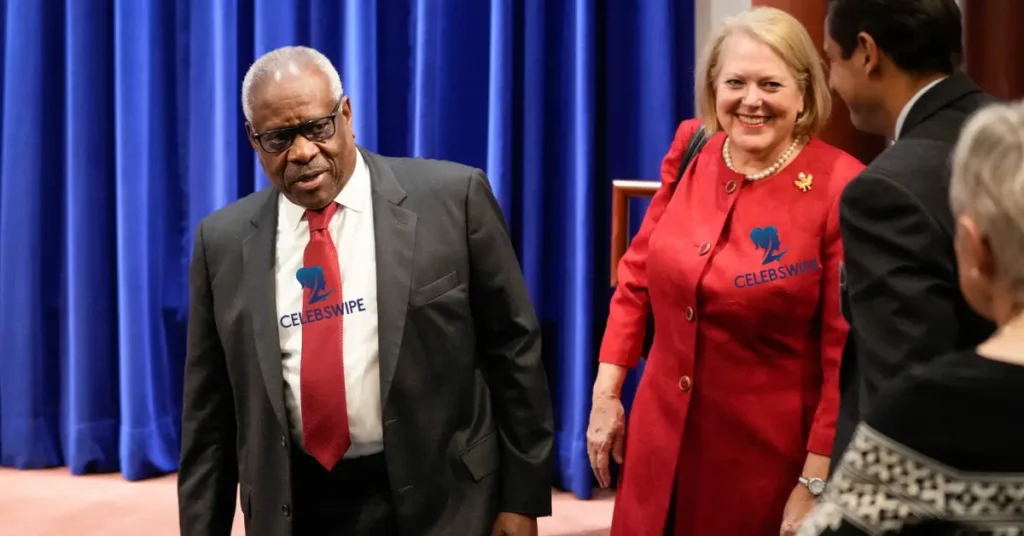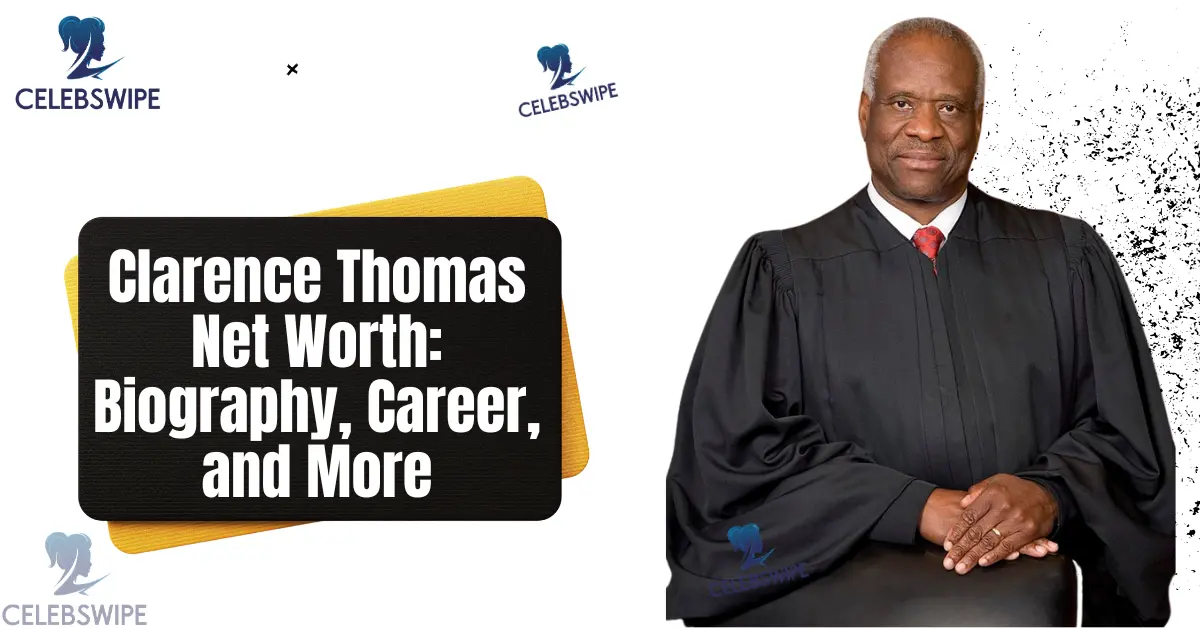Clarence Thomas, a significant figure in the U.S. Supreme Court, has left a lasting impact on American law and politics. Serving as an Associate Justice since 1991, his judicial opinions and personal controversies have kept him in the public eye. Beyond his role in shaping legal history, his finances and personal choices, including undisclosed trips and connections to Republican billionaires, have raised questions about ethics and transparency.
This article explores Clarence Thomas’s net worth, his rise to prominence as an African American legal leader, and his enduring influence on the Supreme Court. By delving into his biography, career milestones, and financial controversies, we offer an in-depth look at one of America’s most debated justices.
Who is Clarence Thomas?
Clarence Thomas is an Associate Justice of the U.S. Supreme Court, known for his conservative cast and unwavering support for interpreting the U.S. Constitution in its original form. Appointed by George H. W. Bush in 1991 to succeed Thurgood Marshall, he became the second African American justice in the Court’s history. Born in Pin Point, Georgia, Thomas overcame immense challenges, including poverty and racial discrimination, to achieve his current role.
His career reflects a mix of steadfast ideology and deep controversy. From his early legal work at the Equal Employment Opportunity Commission (EEOC) to his contentious confirmation hearings led by the Senate Judiciary Committee, Thomas’s journey has been a focal point in discussions about race, judicial ethics, and the role of money in politics.
Clarence Thomas Bio
Clarence Thomas was born on June 23, 1948, in Pin Point, Georgia, a small African American community near Savannah. Raised in a poor household, his early life was marked by struggles, including the absence of basic utilities like running water. Despite these hardships, he excelled academically and earned a scholarship to attend the College of the Holy Cross. He later graduated from Yale Law School, a top institution in the United States.
| Quick Facts About Clarence Thomas | Details |
| Full Name | Clarence Thomas |
| Date of Birth | June 23, 1948 |
| Birthplace | Pin Point, Georgia |
| Education | College of the Holy Cross, Yale Law School |
| Appointed to the Supreme Court | 1991, by George H.W. Bush |
| Net Worth | Estimated $1 million to $5 million |
Clarence Thomas Net Worth

Clarence Thomas’s net worth is estimated to range between $1 million and $5 million. This figure includes his associate justice salary, which is approximately $285,400 annually, along with his pension assets and investments. However, questions have arisen regarding his financial transparency, particularly due to allegations of undisclosed trips and ties to Republican billionaires like Harlan Crow.
A report from ProPublica highlighted luxury trips and gifts that Thomas allegedly did not include in his financial disclosure forms, raising concerns about adherence to the Supreme Court code of conduct. Such controversies underscore the importance of financial accountability in public office and have fueled debates about implementing stricter ethical guidelines for justices.
Early Life and Education
Growing up in Pin Point, Georgia, Thomas experienced the harsh realities of racial segregation and poverty. His grandparents played a pivotal role in his upbringing, instilling discipline and a strong work ethic. He excelled in school and pursued higher education at the College of the Holy Cross, where he studied English.
After graduating, Thomas attended Yale Law School, where he faced the challenges of being one of the few Black students in an elite academic environment. His education shaped his judicial philosophy, emphasizing a strict interpretation of the U.S. Constitution, which has defined his career as a Supreme Court Justice.
Career
Department of Education and Equal Employment Opportunity Commission
Thomas’s career began with roles that shaped his understanding of civil rights and workplace fairness. Under Ronald Reagan, he served as chair of the Equal Employment Opportunity Commission (EEOC), where he tackled issues of racial and gender discrimination. His time at the Department of Education further cemented his reputation as a staunch conservative.
Federal Judgeship and Supreme Court Nomination
In 1990, George H.W. Bush nominated Thomas to the U.S. Court of Appeals for the D.C. Circuit. Just a year later, Bush selected him to replace Thurgood Marshall on the U.S. Supreme Court. His confirmation process was highly controversial, with the Senate Judiciary Committee scrutinizing allegations of sexual harassment brought forward by Anita Hill. Despite the uproar, Thomas secured his position, marking the start of his long tenure.
Supreme Court Opinions and Jurisprudence
Clarence Thomas has consistently supported a conservative cast in his rulings, focusing on limiting federal power and protecting individual liberties as outlined in the U.S. Constitution. He is known for his silence during oral arguments, preferring to let his written opinions speak for his judicial philosophy.
His landmark decisions include opinions on Second Amendment rights, religious freedom, and restrictions on federal authority. These rulings have solidified his role as a leading voice in shaping modern conservative jurisprudence.
Judicial Ethics Controversies

Ethics controversies have dogged Thomas throughout his career. Reports of accepting luxury trips and failing to disclose financial ties to prominent figures like Harlan Crow have raised questions about his adherence to the Supreme Court code of conduct. Critics argue that these actions undermine public trust in the judiciary.
Recently, the Judicial Conference declined to refer allegations against Thomas to the Attorney General, fueling debates about the lack of accountability mechanisms for Supreme Court Justices. Calls for reform have grown louder, emphasizing the need for greater transparency and stricter ethical guidelines.
Federal Courts Decline to Refer Justice Clarence Thomas to Attorney General Over Ethics Controversies
Recent controversies surrounding Supreme Court Justice Clarence Thomas have spotlighted the broader issue of ethics in the judiciary. Allegations of accepting lavish gifts, luxury trips, and financial benefits from wealthy benefactors like Republican billionaire Harlan Crow have led to significant public scrutiny. Despite the concerns, federal courts recently decided not to refer Thomas to the Attorney General for further investigation, intensifying debates over judicial accountability.
The Ethics Allegations
Justice Clarence Thomas has been accused of failing to disclose financial transactions and undisclosed trips funded by prominent figures, particularly Harlan Crow, a conservative donor. Reports from organizations like ProPublica revealed that Thomas allegedly received luxury vacations and other benefits over the years.
These reports claim that such gifts were not included in Thomas’s required financial disclosure forms, raising concerns about his compliance with the Supreme Court code of conduct.
Critics argue that these alleged actions compromise the integrity of the U.S. Supreme Court, creating potential conflicts of interest. Transparency advocates insist that all justices, regardless of stature, must adhere to the highest standards of judicial ethics to maintain public trust in the judiciary.
Federal Court Decision
The Judicial Conference, the policymaking body for federal courts, recently announced its decision not to refer Justice Thomas to the Attorney General for further investigation. This decision came after calls from watchdog organizations and several members of Congress, including the Senate Judiciary Committee, to address the allegations formally.
The Judicial Conference stated that while concerns about ethics are valid, the current framework does not mandate referrals for Supreme Court justices under such circumstances. The lack of a binding Supreme Court code of conduct, unlike the strict guidelines applicable to lower federal court judges, further complicates enforcement and oversight.
Legal Implications
The decision not to pursue further investigation underscores the unique position of Supreme Court justices in the U.S. legal system. Unlike other federal judges, the Supreme Court operates with significant autonomy. This independence is meant to protect justices from political interference, but it also leaves gaps in accountability.
The absence of a clear mechanism to investigate and address alleged breaches of ethics raises questions about the effectiveness of existing judicial oversight. Calls for reform, including the implementation of a binding code of conduct for Supreme Court justices, have intensified as a result.
Public and Political Reaction
The decision has drawn criticism from various quarters. Advocacy groups argue that the inaction sets a troubling precedent, undermining trust in the judiciary. Members of the Senate Judiciary Committee have expressed dissatisfaction, stating that unchecked behavior by justices threatens the credibility of the Court.
On the other hand, supporters of Thomas argue that the allegations are politically motivated, designed to discredit a justice known for his conservative cast and significant influence on U.S. Supreme Court decisions.
Calls for Reform
The controversy surrounding Justice Thomas has reignited debates over judicial ethics and transparency. Proposals for reform include:
| Proposed Reform | Details |
| Binding Code of Conduct for Justices | Introducing a formal ethical code specifically for Supreme Court justices. |
| Strengthened Financial Disclosure | Requiring more detailed and transparent financial reporting from all federal judges. |
| Independent Oversight Mechanisms | Creating an independent body to review allegations of misconduct against Supreme Court justices. |
Prominent figures, including Justice Sonia Sotomayor and Chief Justice John Roberts, have previously emphasized the importance of maintaining public trust. However, implementing reforms requires bipartisan support, which remains challenging in a polarized political climate.
Frequently Asked Questions
What is Clarence Thomas’s net worth?
His net worth is estimated between $1 million and $5 million, comprising his salary, investments, and pension assets.
Has he faced controversies?
Yes, he has been involved in financial controversies regarding undisclosed trips and luxury gifts from Republican billionaires.
How long has he served on the Supreme Court?
He has been a Supreme Court Justice since 1991, making him the longest-serving current justice.
Conclusion
Clarence Thomas is a pivotal figure in the U.S. Supreme Court, known for his unwavering conservative principles and significant influence on American law. While his legal career is remarkable, ongoing judicial ethics controversies continue to spark debates about transparency and accountability in the judiciary.
Through his work, Thomas has left a lasting mark on the U.S. Constitution, shaping its interpretation for generations to come.

